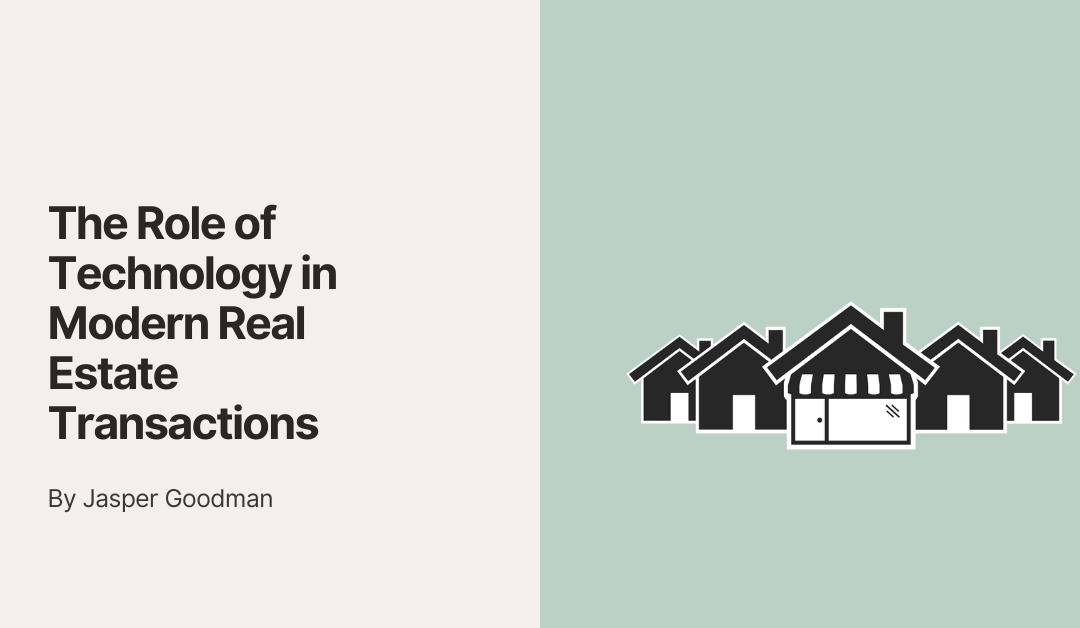Technology streamlines modern real estate transactions by enhancing efficiency and transparency. Tools like virtual tours, AI, and blockchain redefine how properties are bought and sold.
In today’s fast-paced real estate market, technology plays an essential role in transforming traditional practices. Innovations such as virtual reality offer immersive property tours, allowing potential buyers to explore homes remotely. Artificial intelligence analyzes client preferences, creating tailored listings that enhance the search process.
Blockchain technology ensures secure, transparent transactions, reducing the risk of fraud. Digital documentation simplifies the administrative tasks involved, allowing for faster closings. With these advancements, both buyers and sellers enjoy a more efficient and user-friendly experience. Embracing technology not only streamlines transactions but also makes real estate more accessible to a global audience.
Introduction To Technology In Real Estate
Technology is rapidly transforming the real estate industry. It changes how properties are bought, sold, and managed. Digital tools simplify complex transactions. Innovations enhance customer experiences and streamline operations.
The Shift Towards Digital
The real estate market is shifting to digital solutions. Traditional methods often require extensive paperwork and time. Technology reduces these challenges significantly.
- Online Listings: Buyers can explore properties from anywhere.
- Digital Signatures: Contracts can be signed electronically.
- Virtual Tours: Clients can view homes remotely.
This shift increases efficiency and accessibility. Agents can connect with clients more easily. Buyers enjoy the convenience of browsing properties at their own pace.
Key Technologies Reshaping The Industry
Several key technologies are reshaping real estate transactions:
| Technology | Description | Benefits |
|---|---|---|
| Blockchain | A secure digital ledger for transactions. | Enhances transparency and reduces fraud. |
| Artificial Intelligence | AI analyzes data to provide insights. | Offers tailored property recommendations. |
| Virtual Reality | Immersive property viewing experiences. | Attracts global buyers without travel. |
| Property Management Software | Tools for managing rental properties. | Simplifies communication between landlords and tenants. |
These technologies improve the buying and selling process. They create opportunities for real estate professionals and clients alike. Embracing technology is essential for success in the modern market.

Credit: jaspergoodman.com
Blockchain And Smart Contracts
Blockchain technology is changing real estate transactions. It offers secure and transparent methods for buying and selling properties. Smart contracts automate agreements, making them faster and safer. These technologies reduce fraud and enhance trust among parties involved.
Enhancing Security And Transparency
Blockchain provides a decentralized ledger. This means all transactions are recorded securely and can’t be altered. It enhances security in several ways:
- Immutable records: Once data is added, it can’t be changed.
- Decentralization: No single point of failure exists, reducing risk.
- Verification: Parties can easily verify ownership and transaction history.
Smart contracts add another layer of security. They automatically execute when conditions are met. This ensures all terms are fulfilled before the deal closes. Here are some key benefits:
- Trust: Reduces reliance on intermediaries.
- Clarity: All terms are clearly defined in code.
- Efficiency: Speeds up the closing process.
Streamlining Transactions
Blockchain and smart contracts simplify the often complex process of real estate transactions. They automate many tasks, reducing time and effort. Here’s how:
- Automatic execution: Smart contracts execute automatically.
- Fewer intermediaries: Reduces costs and speeds up the process.
- Real-time updates: All parties can access current information.
With these technologies, buyers and sellers experience a smoother process. They can focus on what matters most—making informed decisions.
Artificial Intelligence In Property Listings
Artificial Intelligence (AI) is revolutionizing property listings in real estate. It enhances the buying and selling experience. AI analyzes user preferences to generate personalized property suggestions. This technology streamlines the process, making it quicker and more efficient.
Tailor-made Property Suggestions
AI can create customized property listings for each user. It examines previous searches and interactions. This leads to more relevant options for potential buyers.
- User Preferences: AI tracks what users like.
- Search History: It analyzes past searches.
- Market Trends: It incorporates current market data.
These factors help AI suggest properties that meet specific needs. Buyers feel more satisfied with tailored options. This personalization makes the property search more enjoyable.
Profiling Techniques For Targeted Offers
Profiling techniques enhance AI’s ability to connect buyers with properties. AI uses demographic data to understand buyer needs. This results in targeted offers that appeal to first-time buyers.
| Demographic Factors | Potential Property Features |
|---|---|
| Age Group | Size of the home |
| Income Level | Price range |
| Family Size | Number of bedrooms |
AI analyzes successful past transactions. It identifies patterns that work for similar clients. This data-driven approach increases the chances of closing deals.
AI simplifies property listings. It makes buying and selling more effective. Users experience a more connected and personalized journey.

Credit: www.rei.mba
Virtual And Augmented Reality Tours
Virtual and augmented reality (VR/AR) tours have changed how people view properties. These technologies offer immersive experiences. Buyers can explore homes from anywhere in the world. This innovation saves time and enhances convenience for both buyers and sellers.
Immersive Property Viewing Experiences
Immersive property viewing experiences create a sense of presence. Users can walk through rooms and see every detail. This technology allows buyers to:
- Visualize space and layout effectively
- Experience properties without physical visits
- Interact with features like lighting and furniture placement
VR/AR tours provide unique benefits:
| Benefit | Description |
|---|---|
| Enhanced Engagement | Captivates potential buyers with realistic experiences. |
| Time Efficiency | Reduces the need for multiple in-person showings. |
| Informed Decisions | Helps buyers make better choices before visiting. |
Global Reach For Sellers
VR/AR technology expands the market for sellers. Properties can reach buyers worldwide. This technology breaks geographical barriers.
Sellers can enjoy various advantages:
- Showcase properties to international buyers
- Attract diverse audiences
- Increase competition and potential offers
In today’s digital age, utilizing VR/AR tours is essential. They enhance property visibility and improve the buyer’s journey. Sellers can stand out in a crowded market with these innovative tools.
Data-driven Insights For Agents
Technology has transformed real estate by providing valuable data-driven insights. Agents now utilize advanced tools to access crucial information. This helps them make informed decisions and serve clients better. Understanding market dynamics and historical data is key for successful transactions.
Access To Historical Sales Data
Historical sales data offers agents a wealth of information. It includes details on previous transactions, pricing, and neighborhood changes. Access to this data allows agents to:
- Evaluate property values
- Identify pricing trends
- Predict future market behavior
By analyzing past sales, agents can provide accurate property valuations. This builds trust with clients and enhances their credibility.
| Data Type | Importance |
|---|---|
| Property Prices | Helps in setting competitive pricing |
| Neighborhood Trends | Identifies desirable areas for buyers |
| Time on Market | Guides sellers on listing duration |
Understanding Market Trends
Understanding market trends is vital for agents. They can track shifts in buyer preferences and economic factors. Here are key trends to monitor:
- Interest rates
- Supply and demand
- Emerging neighborhoods
By staying informed, agents can guide clients effectively. They can recommend the right time to buy or sell. This proactive approach enhances client satisfaction.
Data-driven insights empower agents. They make decisions based on facts, not guesswork. This leads to successful transactions and happy clients.
Digital Documentation And Signing
Digital documentation and signing streamline real estate transactions, enhancing efficiency and reducing paperwork. By utilizing technology, buyers and sellers can execute contracts securely and swiftly, significantly improving the overall experience. This modern approach fosters transparency and accessibility in real estate dealings.
Digital documentation and signing are changing how real estate transactions occur. Paperwork once took days or weeks. Now, it can happen in minutes. This shift enhances efficiency and security in the entire process.
Revolutionizing Administrative Processes
Technology simplifies administrative tasks in real estate. Traditional methods involved stacks of paper. Now, digital solutions make everything easier.
- Cloud Storage: Access documents anytime, anywhere.
- Automated Workflows: Reduce time spent on repetitive tasks.
- Secure Sharing: Protect sensitive information with encryption.
Real estate agents can focus more on clients. They spend less time on paperwork. This shift leads to improved service and faster transactions.
Efficiency In Document Handling
Digital signing platforms streamline document handling. No more waiting for signatures. The process is quick and efficient.
| Benefits of Digital Signing | Traditional Signing |
|---|---|
| Speed: Instant signatures available. | Delays due to scheduling. |
| Cost-Effective: Saves printing and mailing costs. | High printing and postage expenses. |
| Eco-Friendly: Reduces paper usage. | Heavy paper consumption. |
| Tracking: Easily monitor document status. | Hard to track paper documents. |
With digital signing, agents can close deals faster. Clients appreciate the convenience. This method leads to higher satisfaction rates.
Technology In Real Estate Development
Technology plays a crucial role in modern real estate development. It enhances efficiency and ensures better decision-making. Developers now use advanced tools to streamline projects. This leads to faster construction and improved quality.
Various technologies are transforming the way buildings are designed and constructed. Sustainable practices and innovative solutions are paving the way for a brighter future.
Sustainability And Innovation
Sustainability is a key focus in real estate development. Developers aim to create eco-friendly buildings. Innovative technologies help achieve this goal. Here are some methods used:
- Green Building Materials: Using recycled and sustainable materials.
- Energy Efficiency: Implementing solar panels and energy-efficient systems.
- Water Conservation: Installing rainwater harvesting systems.
These practices not only reduce environmental impact but also lower operational costs. Investing in sustainable technologies attracts eco-conscious buyers.
The Future Of Construction Technology
The future of construction technology is bright. Innovations are reshaping the building landscape. Key technologies include:
| Technology | Description |
|---|---|
| 3D Printing | Creates building components quickly and efficiently. |
| Drones | Monitors construction sites and surveys land. |
| Building Information Modeling (BIM) | Enhances collaboration through digital building designs. |
These technologies improve project management. They also reduce waste and save time. The integration of technology in construction promises a more efficient future.
Impact On Real Estate Investing
The impact of technology on real estate investing is profound. Investors now have access to tools that simplify processes and enhance decision-making. Technology reduces the complexities of buying, selling, and managing properties. This shift creates new opportunities and strategies for success in the market.
Emerging Tools And Trends
Several tools and trends are reshaping real estate investing:
- Blockchain Technology: Offers secure and transparent transactions.
- Artificial Intelligence (AI): Analyzes data to predict market trends.
- Virtual Tours: Provides immersive experiences for prospective buyers.
- Data Analytics: Helps in making informed investment decisions.
These innovations create a more efficient investing landscape. Investors can easily access information and analyze properties from anywhere. This accessibility leads to quicker decision-making and increased market participation.
The Investor’s Perspective
Investors benefit greatly from modern technology:
- Informed Decisions: Data analytics provides insights into market trends.
- Cost Efficiency: Online platforms reduce marketing and operational costs.
- Wider Reach: Investors can connect with global markets easily.
- Speed: Transactions can be completed faster through digital means.
Investors can now analyze properties with precision. They can view historical data, compare market prices, and predict future trends. This capability enhances the overall investment strategy and reduces risks.
| Technology | Benefits |
|---|---|
| Blockchain | Secure transactions, reduced fraud |
| AI | Market predictions, tailored listings |
| Virtual Tours | Global exposure, enhanced buyer experience |
| Data Analytics | Informed decisions, risk assessment |
Technology is revolutionizing how investors approach real estate. The combination of these tools leads to smarter investments and greater profitability.
Frequently Asked Questions
How Does Technology Play A Role In Real Estate?
Technology revolutionizes real estate by enabling virtual tours, streamlining transactions through blockchain, and enhancing property management with AI. These innovations improve efficiency, accessibility, and customer experience, transforming how properties are bought and sold. Data analytics also guide informed decision-making for buyers and sellers alike.
What Technology Is In Real Estate Transactions?
Real estate transactions utilize various technologies. Key tools include blockchain for secure transactions, virtual tours for property viewing, and AI for personalized listings. Digital signatures and documentation streamline paperwork, enhancing efficiency. These innovations transform how properties are bought, sold, and managed, improving the overall experience for all parties involved.
Are There Any Technological Or Ai Advances In Real Estate Transactions?
Yes, technology and AI are transforming real estate transactions. AI personalizes property listings and offers. Virtual tours enhance buyer experiences, while blockchain ensures secure transactions. Digital signatures streamline paperwork, making processes faster and more efficient. These advancements improve accessibility and transparency in the real estate market.
How Has Technology Changed Real Estate In The Last 15 Years?
Technology has transformed real estate significantly in the last 15 years. Virtual tours, AI-driven listings, and blockchain transactions enhance efficiency. Digital documentation simplifies processes, while smart home features attract buyers. Overall, technology streamlines buying, selling, and managing properties, creating a more accessible market.
Conclusion
Technology has undeniably reshaped the landscape of real estate transactions. Its innovations enhance efficiency, transparency, and accessibility for all parties involved. As we move forward, embracing these advancements will be crucial for success in the market. The future of real estate is bright, driven by technology’s transformative power.
